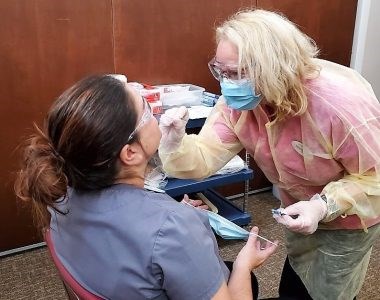A Collingwood-based agency whose staff offer support to long-term care and retirement home residents, as well as home-care clients has joined a provincial pilot project to incorporate rapid COVID testing into its regular routines.
Nancy Esson, owner of Right at Home Canada, Georgian Triangle, said she jumped at the opportunity to join the pilot program as soon as she saw the call-out for participants.
“We are doing everything we can to make sure that our clients and staff are safe,” said Esson. “The rapid tests are another tool we’ve turned to.”
A rapid test can produce a result within 15 minutes while both the test administrator and the person being tested are still in the same room.
Right at Home Canada, Georgian Triangle covers territory from Meaford to Muskoka, and areas in between including Orillia and Barrie. The main office is in Collingwood. The staff include companions who would do things like food prep, gardening, walking dogs, and anything else that needs to be done for a home care client. There are also personal support workers, nurses, and registered practical nurses on staff with Right at Home.
Ontario announced the rapid test pilot project in November, with a news release stating the project would be “an important opportunity to learn about the value of antigen screening for asymptomatic workers in a range of workplace settings.”
The rapid tests involve a nasal swab like the regular COVID-19 test, however, a reagent is added to the swab immediately then applied to a device that looks similar to a pregnancy test. Two lines means the swab tested positive for COVID-19.
Since starting the rapid tests in December, Esson said there has been one positive result, which turned out to be a false positive since two more rapid tests and a regular polymerase chain reaction (PCR) test all produced negative results.
The protocol for a positive rapid test result is the same for Right at Home. Anyone receiving a positive result has to go home and self-isolate for 14 days.
“It’s not designed to be failsafe testing,” said Esson. “But it does take away some of the anxiety, but not all of it.”
Right at Home offers its staff the rapid test once a week, but it is only done on a voluntary basis.
She has to report the results and anyone who tests positive with a rapid test has to get a lab-confirmed PCR test as well.
Esson said she has offered some rapid tests to members of the community who were concerned after being exposed to a positive case.
Esson said the rapid tests, produced by Abbott Lab, are meant to be a screening tool. She would like to see their use become more widespread as early detection of COVID-19 cases.
In addition to allowing employers to opt into the pilot project (the employers are responsible for covering the costs of the rapid tests), the province provided some rapid tests to hospitals and long-term care homes in Ontario, including facilities in Simcoe-Muskoka region. Orillia Soldiers’ Memorial Hospital, for example, has a supply of rapid tests it has been using during the Roberta Place outbreak in Barrie.
At the launch of the pilot project in November, Ontario Health Minister Christine Elliott said the government advocated for the approval of the rapid tests in order to improve access to testing for Ontarians in underserved communities and/or in hotspots where the virus is spreading quickly.



